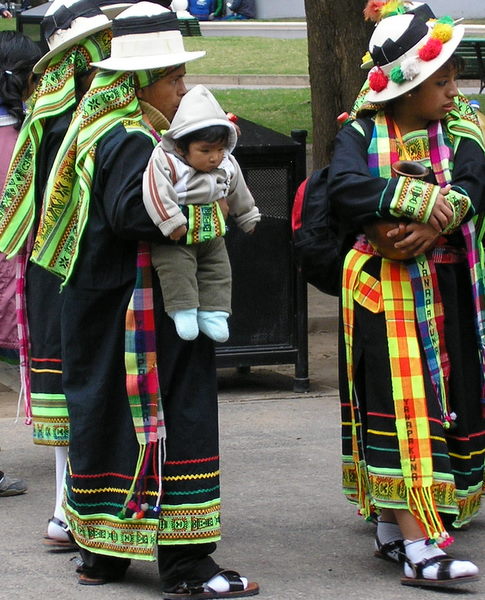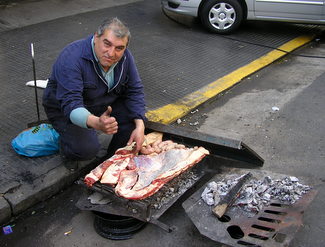|
The Argentine people Latin American, European or distinctly unique? "Latins are tenderly enthusiastic. In Brazil they throw flowers at you. In Argentina they throw themselves."
Marlene Dietrich (1901 - 1992)
Argentines have a reputation in South America for being arrogant. In my experience they have a well deserved reason for national pride. Argentina is the 8th largest country in the world, stretching from deserts at the Bolivian border, to tropical jungles at Iquazu Falls to the highest mountain in the Western Hemisphere - Mt. Aconcagua, a 22,831 foot extinct volcano - to a Darwinian paradise, Tierra del Fuego, just 600 miles from the Antarctic continent - see Maps of Argentina's provinces Its history spans the millennia from the greatest age of the dinosaurs, the magnificent Inca Empire, the golden age of Spanish Imperialism and the establishment of the third wealthiest democracy in the Western hemisphere. Despite American commentators who stress that "...Argentina is an economic basket case..." due to the mercurial whims of political and economic elites - a situation to which no nation has ever had an immunity - I find no evidence of "national depression." What I experience is a thriving society that is aware of the insecurity of economic good times but in love with life. The buzz of Buenos Aires is Manhattan with an Italian awareness of the present - fathers and mothers with young children on their arms, professionals conducting business in a sidewalk café, small shops selling AR$60,000 chinchilla fur bedspreads (US$18,000), food markets offering only organically raised poultry - they don't say it's organic, it just is - and thousands of people at the weekend Feria de Mataderos. Two hour lunch breaks are the norm. Restaurants, which normally don't open for dinner until 9:00 pm, are not full until 11:00 pm. A true "porteno" (native born resident of Buenos Aires) will have a distinct Italian lilt to their Spanish and say "ciao," not "adios," when saying "good-bye." Cordoba is Old Spain - the intellectual heart of the nation. It's a city of eight universities, and the birthplace of the Jesuit philosophy of the social contract between rulers and the ruled - which is still in lively national debate.
The Inca Empire still touches Salta Salta the Beautiful, as it's justifiably known, bears the splendor of Colonial monuments, with archaeological proof of thriving indigenous cultures and the reality of street children eager to shine your shoes. Indigenous language communities founded 6,000 years ago are very much alive in the rugged, semi-arid yet stunning landscape of the Andean Northwest. The Wine Country, especially Mendoza and San Juan Provinces, produce world class vintages using irrigation technology first perfected by indigenous people over 3,000 years ago. Argentine vineyards are the highest in the world - up to 5,000 feet - with 350 days of warm sunshine. The Argentine Mesopotamia is a floating land of jungles, massive rivers, the incomparable Iguazu Falls, splendid cities, mate plantations, magnificent ruins and giant, delicious fish. Patagonia, the vast region that conjures visions of another reality, is another reality. Welsh, German, English, French, Spanish, Eastern Europeans and indigenous cultures thrive on the Atlantic and Andean edges of this land. The long Atlantic coast is home to internationally protected wildlife sites, fishing villages and modern petroleum shipping ports. The flat sparse interior is dotted by multi-thousand acre estancias (ranches), many of which have been owned by the original families for generations, with millions of sheep and a few gauchos. Welsh villages, the first European settlements in Patagonia, are complete with trim, vine covered cottages, pocket gardens and afternoon tea. In the Andean west, are the finest ski resorts and fruit growing lands in South America.
Travel-with-pen-and-palate-Argentina will especially enlighten North Americans about this nation which is simultaneously Latin American, European and distinctly an individual on the world stage.
|

